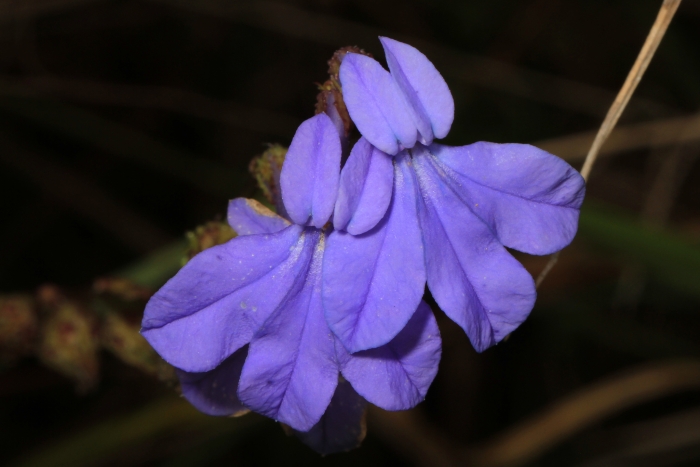Glade Lobelia
(Lobelia glandulosa)
Glade Lobelia (Lobelia glandulosa)
/
/

Judy Gallagher
CC BY-SA 4.0
Image By:
Judy Gallagher
Recorded By:
Copyright:
CC BY-SA 4.0
Copyright Notice:
Photo by: Judy Gallagher | License Type: CC BY-SA 4.0 | License URL: http://creativecommons.org/licenses/by-sa/4.0/ | Rights Holder: Judy Gallagher | Publisher: iNaturalist | Date Created: 2016-12-04T15:21:10-08:00 |
















































Estimated Native Range
Summary
Lobelia glandulosa, commonly known as Glade Lobelia, is a deciduous perennial herb native to wetlands and moist areas in the Southeastern United States, particularly in Florida. It typically grows to a height and width of 1-3 feet (0.3-0.9 meters). This species forms clumps of upright stems with narrow, lance-shaped leaves and produces striking blue to violet flowers with white centers from late summer to fall, which are highly attractive to pollinators such as butterflies and hummingbirds.
Glade Lobelia is valued for its vibrant floral display and its ability to thrive in wet conditions, making it suitable for rain gardens, water edges, and bog gardens. It is also used in borders for its vertical accent and color. In cultivation, it prefers consistently moist to wet soils and can tolerate a range of drainage conditions. It is adaptable to full sun or part shade, but flower production is best with more light. While generally low-maintenance, it can be susceptible to root rot if drainage is poor. There are no widely known popular cultivars, but the species itself is a standout in appropriate settings. It is not typically invasive but should be monitored to ensure it does not spread beyond its desired area.CC BY-SA 4.0
Glade Lobelia is valued for its vibrant floral display and its ability to thrive in wet conditions, making it suitable for rain gardens, water edges, and bog gardens. It is also used in borders for its vertical accent and color. In cultivation, it prefers consistently moist to wet soils and can tolerate a range of drainage conditions. It is adaptable to full sun or part shade, but flower production is best with more light. While generally low-maintenance, it can be susceptible to root rot if drainage is poor. There are no widely known popular cultivars, but the species itself is a standout in appropriate settings. It is not typically invasive but should be monitored to ensure it does not spread beyond its desired area.CC BY-SA 4.0
Plant Description
- Plant Type: Herb
- Height: 1-3 feet
- Width: 1-3 feet
- Growth Rate: Moderate
- Flower Color: Blue
- Flowering Season: Summer, Fall
- Leaf Retention: Evergreen
Growth Requirements
- Sun: Full Sun, Part Shade
- Water: High
- Drainage: Fast, Medium, Slow
Common Uses
Bee Garden, Bird Garden, Butterfly Garden, Deer Resistant, Hummingbird Garden, Low Maintenance, Water Garden
Natural Habitat
Native to wetlands and moist areas in the Southeastern United States, especially in Florida
Other Names
Common Names:
Scientific Names: , Lobelia glandulosa, Lobelia glandulosa var. laevicalyx, Lobelia crassiuscula, Dortmanna glandulosa, Dortmannia glandulosa, Rapuntium glandulosum,
GBIF Accepted Name: Lobelia glandulosa Walter